-
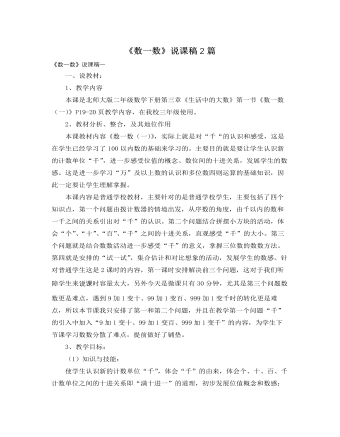
北师大版小学数学二年级下册《数一数》说课稿2篇
本课内容是普通学校教材,主要针对的是普通学校学生,主要包括了四个知识点,第一个问题由拨计数器的情境出发,从序数的角度,由千以内的数和一千之间的关系引出对“千”的认识。第二个问题结合拼摆小方块的活动,体会“个”、“十”、“百”、“千”之间的十进关系,直观感受“千”的大小。第三个问题就是结合数数活动进一步感受“千”的意义,掌握三位数的数数方法。第四就是安排的“试一试”,集合估计和对比想象的活动,发展学生的数感。针对普通学生这是2课时的内容,第一课时安排解决前三个问题,这对于我们听障学生来说课时容量太大,另外今天是微课只有30分钟,尤其是第三个问题数数更是难点,遇到9加1变十、99加1变百、999加1变千时的转化更是难点,所以本节课我只安排了第一和第二个问题,并且在教学第一个问题“千”的引入中加入“9加1变十、99加1变百、999加1变千”的内容,为学生下节课学习数数分散了难点,提前做好了铺垫。
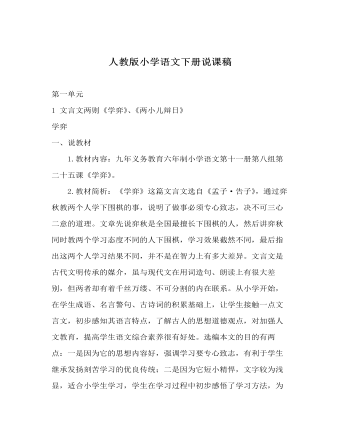
人教版小学语文下册说课稿《学弈》《两小儿辩日》
一、说教材 1.教材内容:九年义务教育六年制小学语文第十一册第八组第二十五课《学弈》。 2.教材简析:《学弈》这篇文言文选自《孟子·告子》,通过弈秋教两个人学下围棋的事,说明了做事必须专心致志,决不可三心二意的道理。文章先说弈秋是全国最擅长下围棋的人,然后讲弈秋同时教两个学习态度不同的人下围棋,学习效果截然不同,最后指出这两个人学习结果不同,并不是在智力上有多大差异。文言文是古代文明传承的媒介,虽与现代文在用词造句、朗读上有很大差别,但两者却有着千丝万缕、不可分割的内在联系
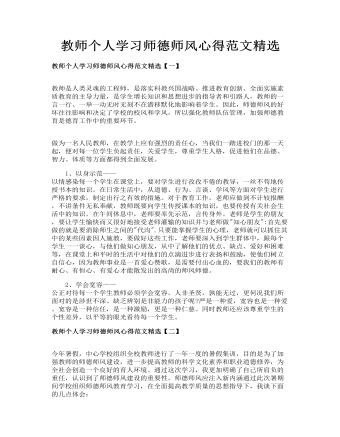
教师个人学习师德师风心得范文精选
1、以身示范——以情感染每一个学生在课堂上,要对学生进行孜孜不倦的教导,一丝不苟地传授书本的知识。在日常生活中,从道德、行为、言谈、学风等方面对学生进行严格的要求,制定出行之有效的措施。对于教育工作,老师应做到不计较报酬,不讲条件无私奉献,教师既要向学生传授课本的知识,也要传授有关社会生活中的知识。在午间休息中,老师要率先示范,言传身外。老师是学生的朋友,要让学生愉快而又很好地接受老师灌输的知识并与老师做"知心朋友":首先要做的就是要消除师生之间的"代沟".只要能掌握学生的心理,老师就可以抓住其中的某些因素因人施教,要做好这些工作,老师要深入到学生群体中,跟每个学生一一谈心,与他们做知心朋友,从中了解他们的优点、缺点、爱好和困难等,在课堂上和平时的生活中对他们的点滴进步进行表扬和鼓励,使他们树立自信心,因为教师事业是一首爱心赞歌,是需要付出心血的,要我们的教师有耐心、有恒心、有爱心才能散发出的高尚的师风师德。
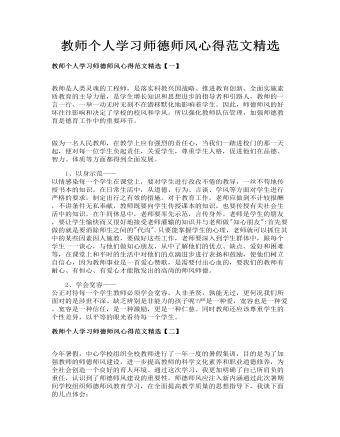
教师个人学习师德师风心得范文精选
1、以身示范——以情感染每一个学生在课堂上,要对学生进行孜孜不倦的教导,一丝不苟地传授书本的知识。在日常生活中,从道德、行为、言谈、学风等方面对学生进行严格的要求,制定出行之有效的措施。对于教育工作,老师应做到不计较报酬,不讲条件无私奉献,教师既要向学生传授课本的知识,也要传授有关社会生活中的知识。在午间休息中,老师要率先示范,言传身外。老师是学生的朋友,要让学生愉快而又很好地接受老师灌输的知识并与老师做"知心朋友":首先要做的就是要消除师生之间的"代沟".只要能掌握学生的心理,老师就可以抓住其中的某些因素因人施教,要做好这些工作,老师要深入到学生群体中,跟每个学生一一谈心,与他们做知心朋友,从中了解他们的优点、缺点、爱好和困难等,在课堂上和平时的生活中对他们的点滴进步进行表扬和鼓励,使他们树立自信心,因为教师事业是一首爱心赞歌,是需要付出心血的,要我们的教师有耐心、有恒心、有爱心才能散发出的高尚的师风师德。
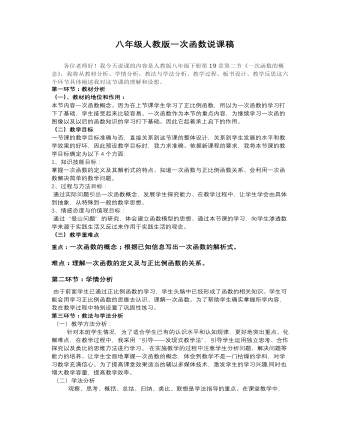
八年级人教版一次函数说课稿
1、知识技能目标:掌握一次函数的定义及其解析式的特点、知道一次函数与正比例函数关系、会利用一次函数解决简单的数学问题。2、过程与方法目标: 通过实际问题引出一次函数概念,发展学生探究能力、在教学过程中,让学生学会由具体到抽象,从特殊到一般的数学思想。 3、情感态度与价值观目标: 通过“登山问题”的研究,体会建立函数模型的思想、通过本节课的学习,向学生渗透数学来源于实践生活又反过来作用于实践生活的观念。
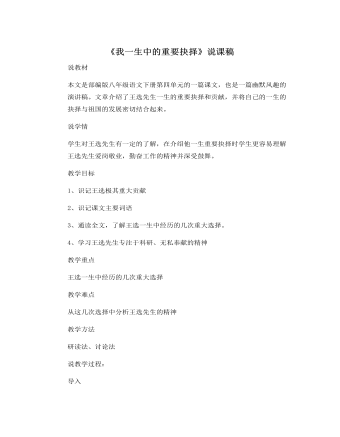
部编版语文八年级下册《我一生中的重要抉择》说课稿
说教材本文是部编版八年级语文下册第四单元的一篇课文,也是一篇幽默风趣的演讲稿。文章介绍了王选先生一生的重要抉择和贡献,并将自己的一生的抉择与祖国的发展密切结合起来。说学情学生对王选先生有一定的了解,在介绍他一生重要抉择时学生更容易理解王选先生爱岗敬业,勤奋工作的精神并深受鼓舞。教学目标1、识记王选极其重大贡献2、识记课文主要词语3、通读全文,了解王选一生中经历的几次重大选择。4、学习王选先生专注于科研、无私奉献的精神教学重点王选一生中经历的几次重大选择教学难点从这几次选择中分析王选先生的精神教学方法研读法、讨论法

中学史地教室设备管理制度
2、教学设备的存放要分类、编号、定室、定橱、定位,专用教室要有防盗、防火等安全措施,做好防潮、防尘和卫生整洁工作。 3、建立健全教学设备管理明细账,定时核对,做到帐、卡、物相符。人员调动时要办理严格的交接手续。 4、教学设备的借用、报废要办理登记和审批手续。外借器材要及时收回,并做好交接手续。
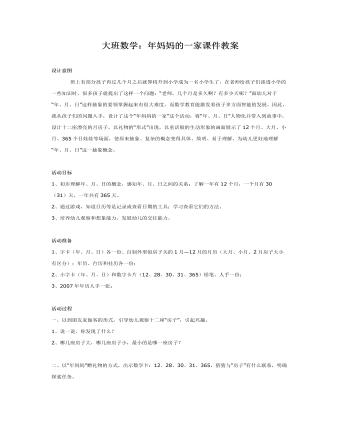
大班数学:年妈妈的一家课件教案
活动目标1、初步理解年、月、日的概念,感知年、月、日之间的关系;了解一年有12个月,一个月有30(31)天,一年共有365天。2、通过游戏,知道日历等是记录或查看日期的工具;学习查看它们的方法。3、培养幼儿观察和想象能力,发展幼儿的交往能力。 活动准备1、字卡(年、月、日)各一份、自制外型似房子关的1月—12月的月历(大月、小月、2月房子大小有区分);年历、台历和挂历各一份;2、小字卡(年、月、日)和数字卡片(12、28、30、31、365)铅笔、人手一份;3、2007年年历人手一张;
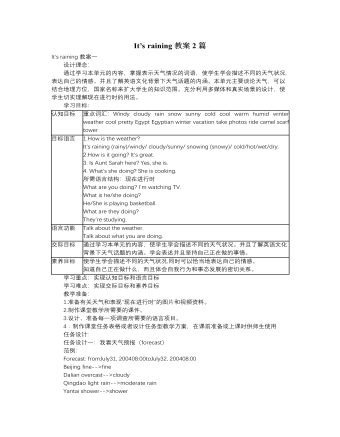
人教版新目标初中英语七年级下册It’s raining教案2篇
1 Each group choose one place to describe and what you are doing in it Choose one place, and describe what they are doing 2 Move around the room and give suggestions Talk about it and write it down 3 Ask one to show their works and act it Choose one of each group to make a report 4 Evaluate the best group and the best reporter Choose the best one Homework Ask your friends their ideal place and write about it教学反思:新课程标准中强调学生在课堂中的主体地位,在综合课中他们的主体地位就更加突出。在各个活动中给不同程度的学生不同层次的任务,让各层面的学生都有表现发挥的机会,从而产生对英语的兴趣。使用照片图片多媒体来辅助教学,效果更好。同时让了解其他国家风景,风俗的同学介绍ideal place,增加学生的背景知知识,实现跨学科交流的目的。教案点评:采用任务型教学模式,在各个活动中给不同程度的学生不同层次的任务,让各层面的学生都有表现发挥的机会,从而产生对英语的兴趣。使用照片图片多媒体来辅助教学,效果更好。让了解其他国家风景,风俗的同学介绍ideal place,增加学生的背景知识,实现跨学科交流的目的。
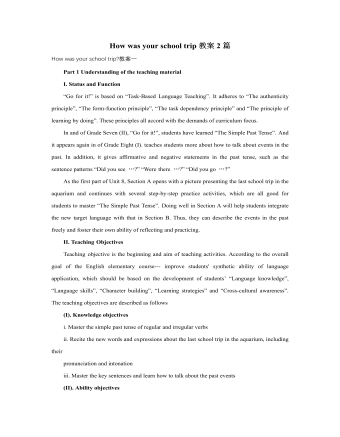
人教版新目标初中英语八年级上册How was your school trip教案2篇
“Go for it!” is based on “Task-Based Language Teaching”. It adheres to “The authenticity principle”, “The form-function principle”, “The task dependency principle” and “The principle of learning by doing”. These principles all accord with the demands of curriculum focus.In and of Grade Seven (II), “Go for it!”, students have learned “The Simple Past Tense”. And it appears again in of Grade Eight (I). teaches students more about how to talk about events in the past. In addition, it gives affirmative and negative statements in the past tense, such as the sentence patterns “Did you see …?” “Were there …?” “Did you go …?” As the first part of Unit 8, Section A opens with a picture presenting the last school trip in the aquarium and continues with several step-by-step practice activities, which are all good for students to master “The Simple Past Tense”. Doing well in Section A will help students integrate the new target language with that in Section B. Thus, they can describe the events in the past freely and foster their own ability of reflecting and practicing. II. Teaching ObjectivesTeaching objective is the beginning and aim of teaching activities. According to the overall goal of the English elementary course--- improve students' synthetic ability of language application, which should be based on the development of students’ “Language knowledge”, “Language skills”, “Character building”, “Learning strategies” and “Cross-cultural awareness”. The teaching objectives are described as follows(I). Knowledge objectivesi. Master the simple past tense of regular and irregular verbsii. Recite the new words and expressions about the last school trip in the aquarium, including their pronunciation and intonation

人教版新目标初中英语八年级上册How do you get to school教案2篇
Step Ⅶ Role play ( Work on 1b)1. First ask two students to read the dialogue to the class.Sa: How do you get to school?Sb: Well, I ride my bike to the subway station. Then I take the subway.2. Now work with a partner.Suppose you use two kinds of transportation to get to school \Hangzhou\Beijing... (bus, train, subway, walking, bike, etc.) Tell how you get there. You may use the phrases in 1a.3. Then ask different pairs of students to present their conversations to the class.Step ⅧListening1. Work on 2a(1) First ask students to read the list of information that Thomas wants to know.…where Nina lives.…how far from school she lives.…how long it takes to get to school.…how she gets to school.…what she thinks of the transportation.(2) Tell students what transportation and bus stop mean.bus stop 汽车站 transportation n. 运送;运输Then tell students we'll hear a recording. Please put a checkmark in front of each thing that Thomas wants to know.(3) Now play the recording for students.( Have students pay attention to the sample answer.) (4) Then correct the answers.
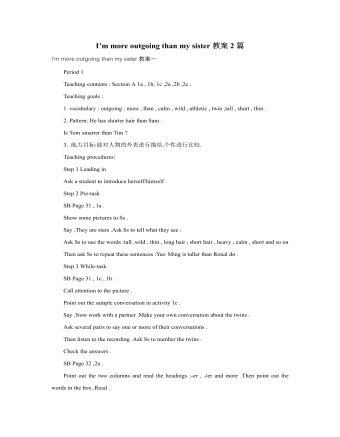
人教版新目标初中英语八年级上册I’m more outgoing than my sister教案2篇
1 交通工具的比较此活动为小组活动。学生通过讨论找出到达某一城市可乘坐的各种交通工具,并选择最佳出行方式。Teacher:We’re going to Shanghai. How many ways can we use to get there? Yes, there are four ways: by bus, by plane, by train, by ship. Please discuss how you are going to get there.操作建议:(1)学生以小组为单位展开活动,谈论本组所选择的交通工具。(2)各组选代表向全班汇报,阐述本组所选择的交通工具的利和弊。完成任务所需要的语言结构:We can go there by ship. It’s more comfortable and cheaper than any other transportation.We can go there by bus. It’s cheaper but it takes longer time.2 哪个城市更合适?此活动具有挑战性。假设中国要举行2014年世界杯足球赛,分别从历史,人文,天气等方面对各城市(北京,大连,上海,昆明)进行比较,选择最佳举办城市。T: Imagine China is holding the 2014 FIFA World Cup. Which city do you think is the best for the World Cup, Beijing, Dalian, Shanghai or Kunming? Let’s work in groups. If you choose Beijing, please join the Team Red. If you chose Dalian, please join the Team White. If you choose Shanghai, please join the Team Blue. If you choose Kunming, please join the Team Green. Please show us its advantages. Then let’s see which team will win.
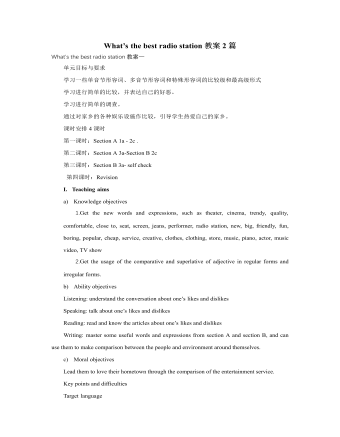
人教版新目标初中英语八年级上册What’s the best radio station教案2篇
教学重点和难点:运用所掌握的语言描述,比较不同地点的特点。在练习中学习掌握英语比较级和最高级的用法。课前准备分配小组,每组五至六人。通过上网或翻阅报刊杂志等方法,确定旅游线路,做出基本的旅游计划。教学设计:本节课流程图 学法指导:1.由于这是一堂新课,在教学中应注意面向全体,发挥学生的主体性,引导学生积极参与,激发学生的求知欲和学习积极性,指导学生积极思维,主动获取知识,养成良好的学习方法。逐步学会独立解决问题。总之要尽可能调动学生的非智力因素促进智力因素的发展。教法选择:1.电化教学法2.课堂讨论法3.任务型教学法采用这些方法的目的是为了充分调动学生的学习积极性,使学生变被动学习为主动学习。通过电脑形象的演示,加强印象,提高兴趣,突破难点,提高教学效率,进而增大教学的容量和信息量。充分体现教师为主导,学生为主体的教学原则。

人教版新目标初中英语八年级下册He said I was hard-working教案2篇
This activity introduces some new vocabulary and provide oral practice using the target language.Task 1 . Ask four students to stand in front of the class, and the teacher asks them the following questions as a reporter.1.What are you going to do when you grow up?2.What are you going to do next week?3.What are going to do after school?The students will give different answers, then ask a good student to report what they said.I am going to e a doctor.What did she say?----------She said she was going to be a doctor.I am going to have a party on Friday night.What did he say?-------He said he was going to have a party on Friday night.I am going to do my homework.What did she say ?------ She said she was going to do her homework.I am going home after school.What did she say?-----She said she was going home after school.Say In this unit we are going to learn to use words like to report what someone said.Task 2. Read the instructions. Then ask a student to read the four questions. And write the words on the Bb. Explain what soap opera is.Task 3. Ask the students to Look at the pictures, point out the TV screens in the picture. Ask one girl to read what Marcia said.What did Marcia say? She said She said she was having a surprise party for Lana on Friday night. Repeat the other pictures in the same way.Activity3. Listen and number the pictures in activity 1a.
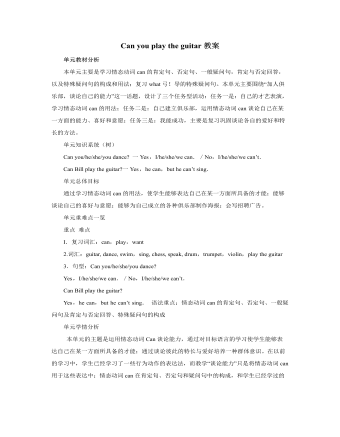
人教版新目标初中英语七年级上册Can you play the guitar教案
本单元主要是学习情态动词can的肯定句、否定句、一般疑问句,肯定与否定回答,以及特殊疑问句的构成和用法;复习what弓!导的特殊疑问句。本单元主要围绕“加人俱乐部,谈论自己的能力”这一话题,设计了三个任务型活动:任务一是:自己的才艺表演,学习情态动词can的用法;任务二是:自己建立俱乐部,运用情态动词can谈论自己在某一方面的能力、喜好和意愿;任务三是:我能成功,主要是复习巩固谈论各自的爱好和特长的方法。单元知识系统(树)Can you/he/she/you dance? 一Yes,I/he/she/we can./No,I/he/she/we can’t.Can Bill play the guitar?一Yes,he can,but he can’t sing.单元总体目标通过学习情态动词can的用法,使学生能够表达自己在某一方面所具备的才能;能够谈论自己的喜好与意愿;能够为自己成立的各种俱乐部制作海报;会写招聘广告。单元重难点一览重点 难点I.复习词汇:can,play,want2.词汇:guitar, dance, swim,sing, chess, speak, drum,trumpet,violin,play the guitar3.句型:Can you/he/she/you dance?Yes,I/he/she/we can./No,I/he/she/we can’t.Can Bill play the guitar?
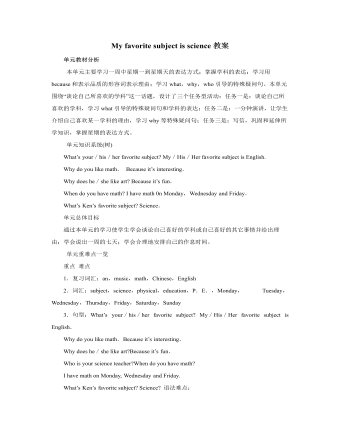
人教版新目标初中英语七年级上册My favorite subject is science教案
本单元主要学习一周中星期一到星期天的表达方式;掌握学科的表达;学习用because和表示品质的形容词表示理由;学习what,why,who引导的特殊疑问句。本单元围绕“谈论自己所喜欢的学科”这一话题,设计了三个任务型活动:任务一是:谈论自己所喜欢的学科,学习what引导的特殊疑问句和学科的表达;任务二是:一分钟演讲,让学生介绍自己喜欢某一学科的理由,学习why等特殊疑问句;任务三是:写信,巩固和延伸所学知识,掌握星期的表达方式。单元知识系统(树)What’s your/his/her favorite subject? My/His/Her favorite subject is English.Why do you like math. Because it’s interesting.Why does he/she like art? Because it’s fun.When do you have math? I have math 0n Monday,Wednesday and Friday.What’s Ken’s favorite subject? Science.单元总体目标通过本单元的学习使学生学会谈论自己喜好的学科或自己喜好的其它事情并给出理由;学会说出一周的七天;学会合理地安排自己的作息时间。

人教版新目标初中英语七年级下册How was your weekend教案2篇
Teaching Goal:1. General aims:Talk about recent past events2. Particular aims:A. Language Focus.Talk about recent past events and think of the past events.B. Language goalsHow was….?It was …What did …do over the weekend?C. Language structures:(1). How was your weekend? I was great. Pay attention to no form.(2). What did you do over the weekend? I played soccer. We went to the beach.D. Useful words and phrases:Words: was, did, went, beach, over, project, test, wasn’t, false, number, geography, spend, week, most, mixture, their, had, little, cook, read, saw, change, everyone, sit, sat, no, anythingPhrases: did one’s homework, played soccer, cleaned my room, went to the beach, played tennis, went to the movies, on Saturday morning, over the weekend, cook … for, what about, do some reading, have a party, talk show, go shoppingE. Grammar language:Present simple past tenseRegular and irregular verbsF. Learning strategies:Tour and holidaysG. Interdiscipinary:H. Emotion and manner:Teaching time: 5 periodsTeaching procedures:Period One教学步骤、时间 教师活动 学生活动 媒体应用Step 1Free talk 3’ Ask some questions like:Who’s on duty today?What’s the weather like? Answer and talk about something.让同学们回答下列问题1. Do you like weekend? (Let some students answer)It takes them three minutes to talk about the question.2. Why do you like weekend? (let the students answer) Most of the students like the weekend此时教师用汉语问:“在周末期间问你干了什么?这句话用英语这么回答?Let the students guess.At last the teacher give them right answer3. What did you do over the weekend?(板书、学习)

人教版新目标初中英语七年级上册What time do you go to school教案
知识与能力复习词汇time,morning,breakfast,get up,g0 t0 bed,homework,clock,afternoon,lunch,run,watch TV,evening,dinner,eat,usually,o’clock,thirty,fifteen,take a shower,go t0 school等;引导学生复习、巩固“询问和谈论时间”的目标语言并运用所学知识安排自己的学习和课外活动。过程与方法运用Summarizing,Classifying和Comparing的学习策略。在复习教学中,运用听写、提问、对话演练与调查活动,促使学生不断地使用所学内容,从而提高他们灵活运用知识的能力。情感态度价值观本部分的主要内容是复习“日常作息时间”的询问和表达。通过互相询问或谈论自己或对方的作息时间安排和活动计划,培养学生良好的作息习惯和守时习惯。教学重、难点及教学突破重点复习词汇time,morning,breakfast,get up,g0 to bed,homework,clock,afternoon,lunch,run,watch TV,evening,dinner,eat,usually,o’clock,thirty,fifteen,take a shower,go to school等;引导学生复习、巩固“询问和谈论时间”的目标语言。

人教版新目标初中英语七年级下册Where is the post office教案2篇
Period 2 (3a----Section B 2c)Preview(Pre-task): Key points: What laAdd another information about their pen pals----their language on the cardnguage does she/he speak?She/He speaks....Does she/he have any brothers and sisters? Does she/he speak English?Preview(Pre-task): Add another information about their pen pals----their language on the cardKey points: What language does she/he speak?She/He speaks....Does she/he have any brothers and sisters? Does she/he speak English?Step 1 Revision1.Revisionand dictation of the new words 2.Revise the drills they learned yesterday.(by pairwork and grammar exercise)Step 2 Leading-inT has a conversation with one student. The conversation is following:---Do you have a pen pal?---Yes, I do.---What's your pen pal's name? ---His/Her name is....---Where is your pen pal from? ---He/She is from...---Where does he/she live? ---He/She lives in....---What language does he/she speak?He/She speaks...Write the new words on the Bb. They are following: EnglishChineseJapaneseFrenchStep 3 LearnLearn the new words with the whole class.Finish 3a with the students3b Pairwork T still does an example with one student Then the Ss practise in pairs. The example is following:--Curry Muray is my pen pal. He is from the United States.---What language does he speak?
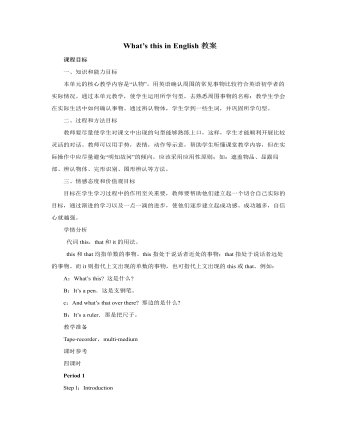
人教版新目标初中英语七年级上册What’s this in English教案
一、知识和能力目标本单元的核心教学内容是“认物”。用英语确认周围的常见事物比较符合英语初学者的实际情况。通过本单元教学,使学生运用所学句型,去熟悉周围事物的名称;教学生学会在实际生活中如何确认事物。通过辨认物体,学生学到一些生词,并巩固所学句型。二、过程和方法目标教师要尽量使学生对课文中出现的句型能够熟练上口,这样,学生才能顺利开展比较灵活的对话。教师可以用手势,表情,动作等示意,帮助学生听懂课堂教学内容,但在实际操作中应尽量避免“明知故问”的倾向,应该采用应用性原则;如:遮盖物品、显露局部、辨认物体、完形识别、图形辨认等方法。三、情感态度和价值观目标目标在学生学习过程中的作用至关重要,教师要帮助他们建立起一个切合自己实际的目标,通过渐进的学习以及一点一滴的进步,使他们逐步建立起成功感。成功越多,自信心就越强。

